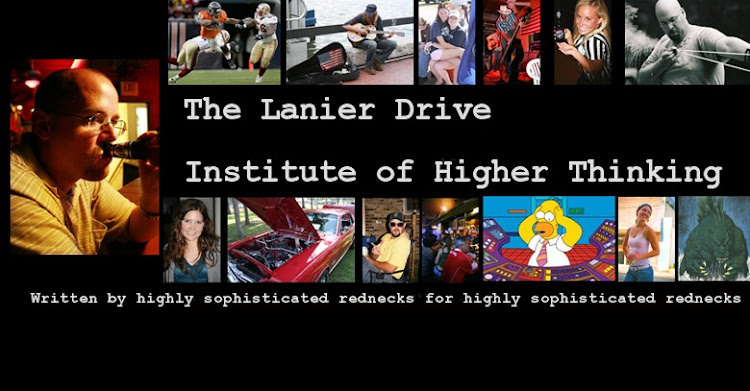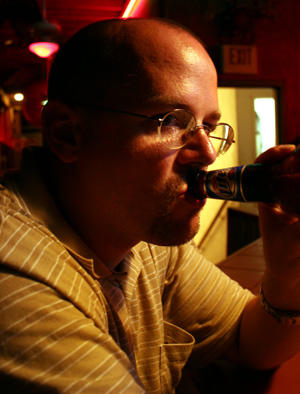Meet the Faculty: Old school, you dig?
We now finish the August edition of "Meet the Faculty," picking up where we left off in part two, with favorite movies dominating the conversation between the Dean and long-lost high school friend Katrina "the she-elf of death" Swaim. Part one is here, by the way. Aside from the final book, which of the individual installments was your favorite (and least favorite, relatively speaking, of course)? Katrina: I also love lamp! Here's the problem with making a list of favorite movies: as soon as you're done with it, you think of ten more movies that should have been added to it! I loved your list, and was nodding and smiling most of the way through it in agreement. We'll have to part ways when it comes to Tarantino, though. While I appreciate something of his style (and he directed one of my all-time favorite CSI episodes, where Nick was buried alive), I'm not a huge fan of the bloodbath as an art form. Sliding Doors and Love, Actually are great recommendations, too. Sliding Doors necessarily makes us wonder about the importance of small moments to our own lives, and I love the vignettes in Love, Actually. There's a universal recognition in these movies of the risks we willingly assume when we open ourselves up to loving another person, and the courage it takes to remold our expectations of love to the shape of its realities. Now on to Harry Potter. The question you asked comes up a lot in discussions between fans, and so far I've yet to meet anyone who shares my opinion, but my favorite of the seven novels is Harry Potter and the Order of the Phoenix . It's dark, and distressing, and the persecution that Harry has always suffered increases exponentially as the Ministry of Magic acts through Delores Umbridge to isolate and silence him. This backdrop of desperation and helpless frustration serves as a perfect foil for the formation of Dumbledore's Army, and it is here, as he instructs and prepares his handful of faithful and courageous friends (the strength of that friendship being one of the pervasive themes of the series), that we first see a glimpse of the Harry who has it in him to face Voldemort in the cataclysmic final battle. I love the transition as Harry, who has always been acted upon by Voldemort and his minions, begins, now, to act. As for least favorite HP book, that's harder. As a true fan, I love them all, and where I love, I'm more than willing to overlook any faults. I suppose, as the weakest link in a strong chain, I'd pick Harry Potter and the Chamber of Secrets. While it is enjoyable to read and full of delightful details, it doesn't do as much to advance the overall story as the other novels. It gives us more of life at Hogwarts, more descriptions of Quidditch games, more instances of the deepening friendship between Harry, Hermione, and Ron, and another Voldemort-engineered attack on Harry, but it doesn't add significantly the Harry/Voldemort story arc, except in retrospect, through observations in subsequent books. Having said that, I still love it. Moaning Myrtle, polyjuice potion, Ginny Weasley's crush on Harry, parseltongue, mudbloods, Dobby--all were introduced in this book, and have taken their place in the history of HP's fictional world. So when I say it's the weak link, that's not saying a lot. By the way, I listened to "Kill the Mullet" yesterday, and it's still stuck in my head. So thanks for that. Scott: I thought the success of the Potter books hinged on different aspects of the storytelling as the series—and Harry—grew up. Through the first four books, much of what made the characters work was that the story was contemporary. Remember, if you go by the strict timeline of the books, Deathly Hallows' final battle took place in the spring of 1998. Yet because Rowling removed her characters from Muggle society and created a whole new milieu for her young characters to interact in, she was able to separate youth culture from popular culture. Her wizarding youth culture effectively created a wizarding pop culture that centered around Quiddich, The Wyrd Sisters and other recognizable aspects of Muggle pop culture turned into something that worked in her world. In the process, her young characters felt that much more real. They had the same interests, fears, triumphs and setbacks as preteens and teenagers everywhere. Through the first four books, establishing this cultural context not only made her world that much more real to the reader, it made us connect with those characters that much more. Going back to what I said earlier—I think all the best stories have a window through which the reader can project themselves. Whether you identified with Ron, Harry or Hermione, a reader could see very real and identifiable aspects of human nature in a story fraught with the otherworldly. That said, Goblet was my favorite book aside from the final and Order of the Phoenix was my least so—like you, though, the difference between fave and least so is such a small gap it is barely worth mentioning. I just thought that some of Harry's surliness in Order felt a little forced. I found myself feeling like Dumbledore and the others weren't paying enough attention to Harry, despite the young wizard's obvious status as The Chosen One. The more I read the Harry Potter books, the more I began to see that particularly in the last three volumes, the story was as much about the relationship between teens and adults. I know your own children are still a few years away from the "terrible teens," but I wonder if you didn't take a few thoughts away from the Dumbledore-Harry, Harry-Sirius, Snape-Dumbledore-Harry, Harry-Weasley-parents, Harry-Dursleys relationships when you think about your own children. Katrina: I think the adults we like the most in HP are the ones who relate to the teenagers in the story as if they are intelligent, independent thinkers, who, while they still need adult guidance and counsel, are capable of making decisions and acting in a substantial way on the world around them. They talk to teenagers as if they are people, showing them respect and offering them the gift of trust for as long as they honor that trust with their actions. I'm thinking here of Sirius, Dumbledore, Mr. Weasley, Lupin, Moody, etc. As a parent, I'm afraid I'm more a Mrs. Weasley type, myself, but that could just be the function of having small children. I hope to evolve. :) Now that's my intellectual assent to the concept; as to how it works in real life, you'll have to get back to me in 10 or 20 years. Scott: And finally, we're in the home stretch: I thought I would wrap up my portion of this little conversation by playing the nostalgia card. Because my family moved away from Atlanta the summer after our senior year, I lost touch with almost everyone I knew in high school over time. Honestly, through college and well after, I was almost constantly reinventing myself, it seemed. I guess given the opportunities, I tried on a lot of different hats in life, some of them ugly, some of them a little tattered but full of character and some perfectly fine, just not on me. I wasn't really comfortable in my own skin until I was about 30, and until I read the book I Love You, Beth Cooper (and, more recently saw Superbad) did I realize that since turning 30, my personality has been more like it was in high school than some new invention forged through the fires of trail-and-error over time. This is what amazes me about you. When we were just kids (or what I would call kids now; sheesh, I'm getting old) you were the most genuine person I knew. I remember days when you could get an entire group of people to smile and laugh just by being your everyday self. This isn't to say that I didn't also observe you change in the ways that 13-18 year-old girls do, shifting your interests and exploring a rapidly widening world. I remember your cheer, your laughter and your writing, which I am jealous of to this day. I told a coworker recently about you in the context of describing the different types of good writers. "Writers like me," I said, "are good writers because we wanted to be writers, decided to be writers and worked hard for a long time to be good writers. My friend Katrina," I went on, "(and my friend Mike, but this isn't about him) are good writers because they have the ears and voices of poets. I can describe a scene to you and it will be a good description—you will see the scene I create. But when Katrina paints a picture, you feel it. You see it and smell it and hear it and it touches you almost physically. Every moment of her life seems to affect her that same way. Or at least she perceives and remembers those moments better than regular people." Every now and then, since high school, I zone in and really write something special, something that goes beyond words and reaches inside a person and plucks a string and resonates with truth. Every time I've done that for the last 12 years, I've thought of it as "Katrina writing." Reading your blog and hearing the stories of your family and your wonderful Luna Lovegood life, I think I recently came to understand that like your disposition in high school, the quality of your writing has more to do with being unafraid to be an individual (and suffer the slings and arrows, etc. etc.) than it does with being the cool kid or the next Jane Austin. I'm glad we've reconnected, and I'm glad you've taken the time to do this little interview. Obviously, I plan to stay in touch—although I'll quit posting our emails on the blog, of course. As always, my "Meet the Faculty" guests get the last word. The floor is open to you, madam. Play the nostalgia card yourself, opine on the merits of your favorite ice cream flavor, describe your master plan to clone your husband and deliver him to needy single women all over the globe—whatever you like, as long as you like. Me bloga es tu bloga. Katrina: Wow, what can I say after all that love? I'm totally going to devote myself to trying to live up to the person I am in your generous, teen-spirit-tinted memories. I rather like the picture you paint of us, and what you wrote about my writing just washed over me in a warm, delicious wave. What a lovely thing to say. Thank you, my friend. I have only this to amend your observations: that you, in fact, belong to a third category of writers—those happy few in whom natural talent and hard work are united. If it weren't for those writers, the rest of us wouldn't have anything to read. I see only good things ahead in your ever-unfolding career. Yeah, we were kids. And we still are, largely. I don't know about you, but most days I feel about seventeen inside. I keep waiting for wisdom and knowledge to zap me like a lightning bolt from above and turn me into one of those perceptive, courageous, insightful adults I've always wanted to be, like Atticus Finch in To Kill a Mockingbird. I wouldn't even mind the scorch marks on my butt if I could suddenly know the answers to questions like "Why can't we all just get along?" and "How do you change people's hearts?" (Or even "What's so hard about filling up the ice cube tray after you empty it, guys?") Whatever the road you took to get there, I have no trouble imagining you as some near-permutation of your high school self, sitting at your keyboard, typing away, face split by the occasional grin as the words come out just the way you want them, gleefully turning over old memories like rocks to see what's still growing beneath them. That's the advantage of this type of correspondence. The intervening years, the ones we haven't witnessed, might as well not exist. It's still Friday night at the Steak 'N Shake. Scott: Before I let you off the hook completely, I really want to talk about two more topics. The first is Harry Potter.
Scott: Before I let you off the hook completely, I really want to talk about two more topics. The first is Harry Potter. Other things to enjoy: Fred and George Weasley's final "farewell" to Hogwarts, Hermione finally revealing her subversive streak, the intense battle at the Ministry between the Death Eaters and the Order, Dumbledore going mad monkey on Voldemort, the power of the press in awakening the wizarding world to danger (if The Quibbler can be classified as "the press"), the not-entirely-complimentary glimpse Harry gets of his father through Snape's memories, and wonderful, heroic Neville. I *heart* Neville Longbottom.
Other things to enjoy: Fred and George Weasley's final "farewell" to Hogwarts, Hermione finally revealing her subversive streak, the intense battle at the Ministry between the Death Eaters and the Order, Dumbledore going mad monkey on Voldemort, the power of the press in awakening the wizarding world to danger (if The Quibbler can be classified as "the press"), the not-entirely-complimentary glimpse Harry gets of his father through Snape's memories, and wonderful, heroic Neville. I *heart* Neville Longbottom. Beginning in Prisoner of Azkaban, the continuity of the books begins to play a more and more significant role, obviously. You could likely begin reading the Harry Potter series with any of the first four books, but after book three, there would be more significant holes in your understanding of the story. Using anything after Goblet of Fire as a starting point for your Harry Potter experience (assuming, of course, you haven't cheated and started with the movies) is out of the question. Since Rowling did such a good job of creating the HP universe in the first four books, she could proceed full steam with the story in the final three volumes—which she does with amazing effectiveness.
Beginning in Prisoner of Azkaban, the continuity of the books begins to play a more and more significant role, obviously. You could likely begin reading the Harry Potter series with any of the first four books, but after book three, there would be more significant holes in your understanding of the story. Using anything after Goblet of Fire as a starting point for your Harry Potter experience (assuming, of course, you haven't cheated and started with the movies) is out of the question. Since Rowling did such a good job of creating the HP universe in the first four books, she could proceed full steam with the story in the final three volumes—which she does with amazing effectiveness. I think that independence (the main bone of contention at the center of the teenager/adult tug-of-war) should be gifted gradually but decisively over the course of the teenage years. If independence is a swimming pool, I hope to let my kids walk down the steps, learn their way through the shallow end while I'm still near enough to play lifeguard, and become confident swimmers before the water rises over their heads. The alternative, often seen in child-centered homes where overprotective or over involved parents reign (Dudley's, for example), is to toss them unceremoniously into the deep end of the pool on the day they leave the house (if they ever do!), to flounder around, trying to stay afloat, or possibly to sink straight to the bottom---drowning, ironically, because we were afraid to let them get in the water.
I think that independence (the main bone of contention at the center of the teenager/adult tug-of-war) should be gifted gradually but decisively over the course of the teenage years. If independence is a swimming pool, I hope to let my kids walk down the steps, learn their way through the shallow end while I'm still near enough to play lifeguard, and become confident swimmers before the water rises over their heads. The alternative, often seen in child-centered homes where overprotective or over involved parents reign (Dudley's, for example), is to toss them unceremoniously into the deep end of the pool on the day they leave the house (if they ever do!), to flounder around, trying to stay afloat, or possibly to sink straight to the bottom---drowning, ironically, because we were afraid to let them get in the water. So as I consider the merits of your husband-cloning suggestion (upside: more radiantly happy women in the world, downside: a global explosion of cheesy one-liners), and dish up a bowl of the best ice cream ever (Breyer's Mint Chocolate Chip), let me just thank you for the opportunity to participate in this conversation. It's been a fun experience, and one I'd love to repeat in person one of these days.
So as I consider the merits of your husband-cloning suggestion (upside: more radiantly happy women in the world, downside: a global explosion of cheesy one-liners), and dish up a bowl of the best ice cream ever (Breyer's Mint Chocolate Chip), let me just thank you for the opportunity to participate in this conversation. It's been a fun experience, and one I'd love to repeat in person one of these days.







|